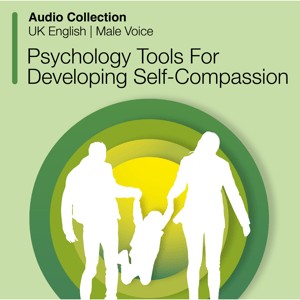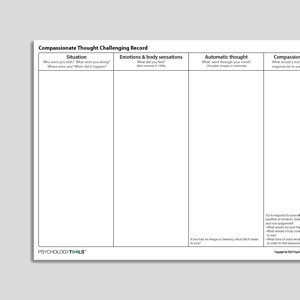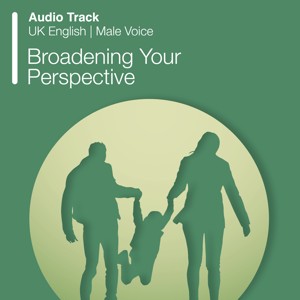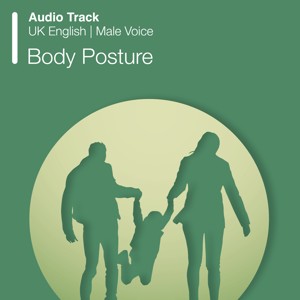Compassion Focused Therapy (CFT)
Compassion-focused therapy (CFT) is a form of psychotherapy developed by Paul Gilbert for people struggling with shame and self-criticism. It is an integration of ideas concerning: Jungian archetypes; evolutionary approaches to human behavior, suffering, and growth; neuroscientific and cognitive-behavioral ideas about the way that people think and behave; and Buddhist philosophy concerning compassion and mindfulness (Gilbert, 2009, 2010, 2014). There is considerable evidence that developing self-compassion is associated with a wide range of benefits including the ability to build positive relationships, increased physical and mental well-being, or the ability to manage voices in psychosis. Read more
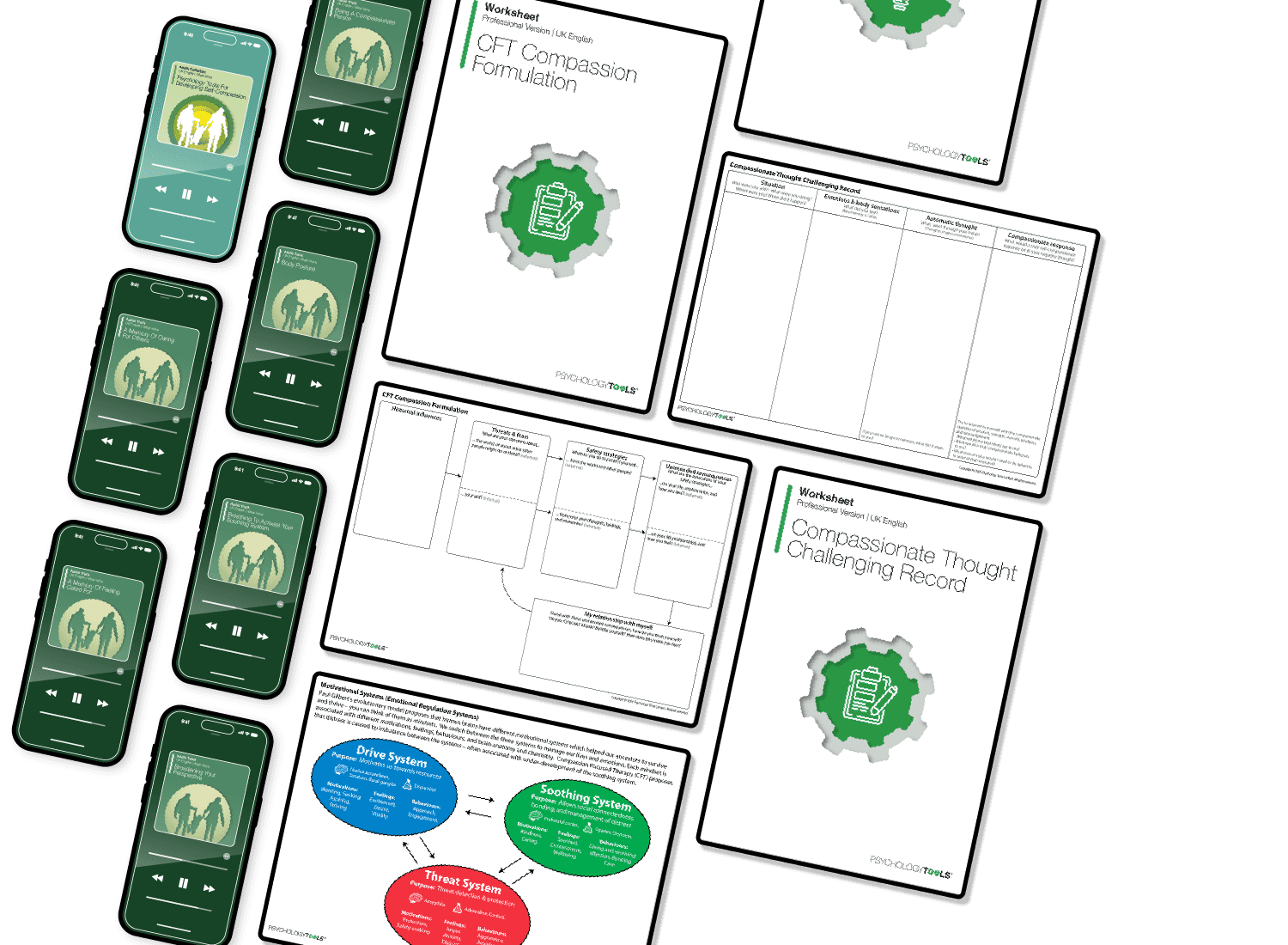
30 of 30 resources
Audio Collection: Psychology Tools For Developing Self-Compassion
Psychology Tools For Developing Self-Compassion is an audio collection which guides clients through an empirically-supported programme of compassionat ...
https://www.psychologytools.com/resource/psychology-tools-for-developing-self-compassion-audio-collection/
Motivational Systems (Emotional Regulation Systems)
At the heart of Compassion Focused Therapy (CFT) is an evolutionary model of human motivational systems. Developed by Paul Gilbert it is a helpful len ...
https://www.psychologytools.com/resource/motivational-systems-emotional-regulation-systems/
Compassionate Thought Challenging Record
Thought challenging records are commonly used in CBT to help people to evaluate their negative automatic thoughts for accuracy and bias. This Compassi ...
https://www.psychologytools.com/resource/compassionate-thought-challenging-record/
Audio Collection: Psychology Tools For Mindfulness
The Psychology Tools For Mindfulness Audio Collection is the perfect way to introduce your clients to the practice of mindfulness. Developed by a clin ...
https://www.psychologytools.com/resource/psychology-tools-for-mindfulness-audio-collection/
What Is Compassion Focused Therapy (CFT)?
Compassion focused therapy (CFT) was developed to work with issues of shame and self-criticism. The CFT model complements and expands the traditional ...
https://www.psychologytools.com/resource/what-is-compassion-focused-therapy-cft/
Breathing To Activate Your Soothing System
The Breathing To Activate Your Soothing System exercise is taken from the Psychology Tools For Developing Self-Compassion audio collection. Listeners ...
https://www.psychologytools.com/resource/breathing-to-activate-your-soothing-system/
CFT Calm Place
The Calm Place Imagery exercise is taken from the Psychology Tools For Developing Self-Compassion audio collection. In this exercise, the listener is ...
https://www.psychologytools.com/resource/cft-calm-place/
Focusing Compassion On Your Self
Focusing Compassion On Yourself is an exercise taken from the Psychology Tools For Developing Self-Compassion audio collection. There are three ‘flo ...
https://www.psychologytools.com/resource/focusing-compassion-on-your-self/
Developing Your Compassionate Other
Developing Your Compassionate Other is an exercise taken from the Psychology Tools For Developing Self-Compassion audio collection. Being connected wi ...
https://www.psychologytools.com/resource/developing-your-compassionate-other/
What Is Compassion, Why Do I Need It, And How Might It Help Me?
What Is Compassion, Why Do I Need It, And How Might It Help Me? is a track taken from the Psychology Tools For Developing Self-Compassion audio collec ...
https://www.psychologytools.com/resource/free-audio-what-is-compassion/
Compassionate Letter Writing
Compassionate Letter Writing is an exercise taken from the Psychology Tools For Developing Self-Compassion audio collection. There are three ‘flows� ...
https://www.psychologytools.com/resource/compassionate-letter-writing/
Mindfulness Of Breathing
Mindfulness Of Breathing is an exercise taken from the Psychology Tools For Developing Self-Compassion audio collection. This short mindfulness exerci ...
https://www.psychologytools.com/resource/mindfulness-of-breathing/
Mindfulness Of Sounds And Thoughts
Mindfulness Of Sounds And Thoughts is an exercise taken from the Psychology Tools For Developing Self-Compassion audio collection. Some people find th ...
https://www.psychologytools.com/resource/mindfulness-of-sounds-and-thoughts/
Free Compassion Audio Tracks
Psychology Tools For Developing Self-Compassion is a 30-track audio collection which guides clients through an empirically-supported programme of comp ...
https://www.psychologytools.com/resource/free-compassion-audio-tracks/
The Three Systems
The Three Systems is a track taken from the Psychology Tools For Developing Self-Compassion audio collection. The three systems conceptualization is a ...
https://www.psychologytools.com/resource/the-three-systems/
Mindfulness Of Body
Mindfulness Of Body is an exercise taken from the Psychology Tools For Developing Self-Compassion audio collection. Some types of mindfulness practice ...
https://www.psychologytools.com/resource/mindfulness-of-body/
Living With A Tricky Brain
Living With A Tricky Brain is a track taken from the Psychology Tools For Developing Self-Compassion audio collection. This introductory track explore ...
https://www.psychologytools.com/resource/living-with-a-tricky-brain/
Mindful Walking
Mindful Walking is an exercise taken from the Psychology Tools For Developing Self-Compassion audio collection. This is a less formal mindfulness prac ...
https://www.psychologytools.com/resource/mindful-walking/
Trying On The Qualities Of Compassion
Trying On The Qualities Of Compassion is an exercise taken from the Psychology Tools For Developing Self-Compassion audio collection. Being connected ...
https://www.psychologytools.com/resource/trying-on-the-qualities-of-compassion/
Compassion To Others
Compassion To Others is an exercise taken from the Psychology Tools For Developing Self-Compassion audio collection. There are three ‘flows’ of co ...
https://www.psychologytools.com/resource/compassion-to-others/
Being A Compassionate Person
Being A Compassionate Person is an exercise taken from the Psychology Tools For Developing Self-Compassion audio collection. Being connected with your ...
https://www.psychologytools.com/resource/being-a-compassionate-person/
Receiving Compassion From Your Ideal Other
Receiving Compassion From Your Ideal Other is an exercise taken from the Psychology Tools For Developing Self-Compassion audio collection. There are t ...
https://www.psychologytools.com/resource/receiving-compassion-from-your-ideal-other/
Combining Soothing Breathing With A Soothing Smell
The Combining Soothing Breathing With A Soothing Smell exercise is taken from the Psychology Tools For Developing Self-Compassion audio collection. Th ...
https://www.psychologytools.com/resource/combining-soothing-breathing-with-a-soothing-smell/
A Memory Of Feeling Cared For
A Memory Of Feeling Cared For is an exercise taken from the Psychology Tools For Developing Self-Compassion audio collection. In CFT, imagery and memo ...
https://www.psychologytools.com/resource/a-memory-of-feeling-cared-for/
The Spotlight Exercise
The Spotlight Exercise is an exercise taken from the Psychology Tools For Developing Self-Compassion audio collection. This short exercise introduces ...
https://www.psychologytools.com/resource/the-spotlight-exercise/
Voice Tone
The Voice Tone exercise is taken from the Psychology Tools For Developing Self-Compassion audio collection. This short exercise guides listeners throu ...
https://www.psychologytools.com/resource/free-audio-voice-tone/
Broadening Your Perspective
Broadening Your Perspective is an exercise taken from the Psychology Tools For Developing Self-Compassion audio collection. Being connected with your ...
https://www.psychologytools.com/resource/broadening-your-perspective/
Body Posture
The Body Posture exercise is taken from the Psychology Tools For Developing Self-Compassion audio collection. This short experiential practice invites ...
https://www.psychologytools.com/resource/body-posture/
A Memory Of Caring For Others
A Memory Of Caring For Others is an exercise taken from the Psychology Tools For Developing Self-Compassion audio collection. In CFT, imagery and memo ...
https://www.psychologytools.com/resource/a-memory-of-caring-for-others/
Facial Expression
The Facial Expression exercise is taken from the Psychology Tools For Developing Self-Compassion audio collection. This short exercise invites the lis ...
https://www.psychologytools.com/resource/facial-expression/
Links to external resources
Psychology Tools makes every effort to check external links and review their content. However, we are not responsible for the quality or content of external links and cannot guarantee that these links will work all of the time.
Case Conceptualization / Case Formulation
- Formulation in Compassion Focused Therapy | Paul Gilbert | 2007
- Training our minds in, with, and for compassion: an introduction to concepts and compassion-focused exercises
Exercises
- Writing a compassionate letter to myself
- Compassionate Letter Writing (Therapist Notes and Client Handout) | Paul Gilbert | 2007
- Compassionate letter writing | Paul Gilbert | 2010
- Building a compassionate image | Compassionate Mind Foundation
Guides and workbooks
- How to develop self-compassion | Russ Harris
Information (Professional)
- Healthy emotion regulation strategies pyramid | Alice Boyes | 2011
Presentations
- An introduction to compassion focused therapy and compassion focused ACT for anxiety and depression | Dennis Tirch & Laura Silberstein Tirch | 2016
- An Introduction to the Theory & Practice of Compassion Focused Therapy and Compassionate Mind Training for Shame Based Difficulties | Paul Gilbert | 2010
- Compassion focused therapy: self-criticism | Paul Gilbert | 2017
- Compassion focused therapy: Is compassion an antidote to shame and an effective phase in the treatment of complex PTSD? | Deborah Lee | 2017
- Introducing compassion focused therapy | Paul Gilbert
Treatment Guide
- Compassionate Friend Group: Facilitator manual | Isabel Clark
- The ‘Compassionate Friend’ group: A 3 session group designed for use in a ward environment | Isabel Clark
- Training our minds in, with, and for compassion: an introduction to concepts and compassion-focused exercises | Paul Gilbert | 2010
Video
- Compassion, anger, strength, and moral indignation | Russel Kolts | 2020
- Relating to voices using CFT | Charlie Herriot-Maitland
- The compassionate kit bag | Kate Lucre, Neil Clapton | 2019
-
CFT Workshop at CCARE
| Paul Gilbert | 2013
- Part 1
- Part 2
- Part 3
- Part 4
- Tragedies of the human mind: DCP lecture | Paul Gilbert | 2015
- Introduction to CFT: Meng Wu Lecture | Paul Gilbert youtube
- Compassion for voices: a tale of courage and hope | Charlie Heriot-Maitland, Kate Anderson youtube
Websites
- Exercises to increase self compassion | Neff, K.
Recommended Reading
- Goss, K., & Allan, S. (2010). Compassion focused therapy for eating disorders. International Journal of Cognitive Therapy, 3(2), 141-158 suomensyomishairioyhdistys.fi
- Compassion Focused Therapy – Procedure Outline
- Gilbert, P. (2009). Introducing compassion focused therapy. Advances in Psychiatric Treatment, 15, 199-208 archive.org
What Is Compassion Focused Therapy?
Assumptions of CFT
- human brains/minds have evolved and have evolved needs (e.g., affection, care, protection, belonging), competencies (e.g., mentalizing, empathy, ability for fantasy) and drives (e.g., seeking safety, achieving dominance). These needs/competencies/drives are associated with different brain systems (old brain / new brain);
- human beings have ‘social mentalities’ that enable them to seek out and form certain types of relationships. In these mentalities or ‘mind sets’ we are motivated to engage in different types of behavior, e.g., care-giving, care-seeking, safety-seeking, achievement-seeking;
- the ability to self-soothe is linked to our attachment experiences;
- humans have at least three types of emotional regulation systems: threat-focused and protection and safety-seeking; drive, excitement, and vitality; affiliative-focused soothing system;
- distress and dysfunction may arise from problematic inputs into the emotion regulation systems (e.g., being made homeless, being trapped in an abusive relationship) or because of dysregulation of the systems (e.g., poorly developed self-soothing abilities);
- the soothing system is our brain’s natural ‘threat regulator,’ which can be activated by disengaging from internal stimulators of threat (e.g., rumination, self-criticism) or by distancing oneself from one’s inner emotions (e.g., via mindfulness). Once activated this system can be used to approach aversive inner experiences in a compassionate frame of mind.
Procedures and Techniques in CFT
- psychoeducation to understand our evolved minds/brains (old brain / new brain);
- the use of mindfulness techniques to compassionately ‘stand back’ from turbulent cognitions and emotion;
- the practice of self-soothing techniques to physiologically change one’s state in order to access different social mentalities;
- to develop self-compassion using imagery in order to activate the brain’s natural threat regulator;
- the use of the (above described) ‘compassionate foundation’ as a base from which to explore and engage with aversive or traumatic inner experiences.
References
- Gilbert, P. (2009). Introducing compassion-focused therapy. Advances in Psychiatric Treatment, 15(3), 199–208.
- Gilbert, P. (2010). Compassion focused therapy. CBT Distinctive Features Series. New York: Routledge.
- Gilbert, P. (2014). The origins and nature of compassion focused therapy. British Journal of Clinical Psychology, 53(1), 6–41.
